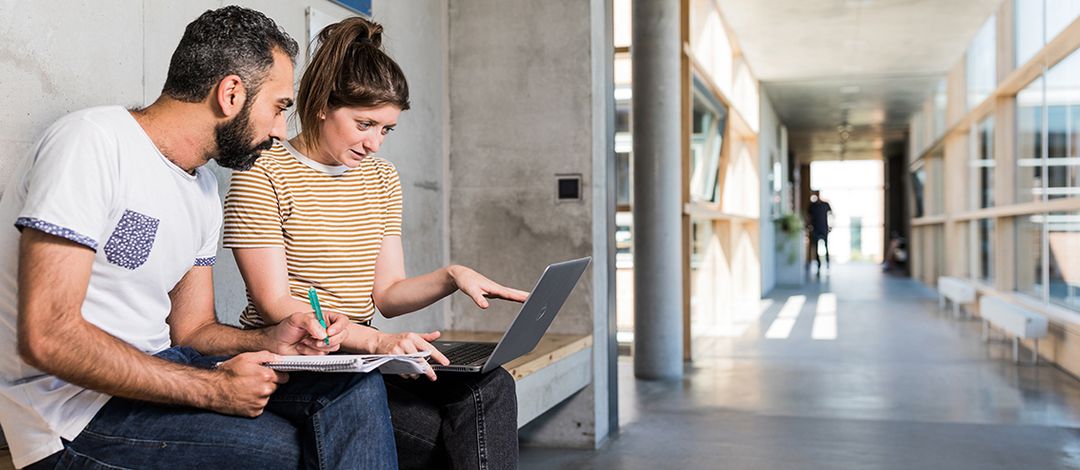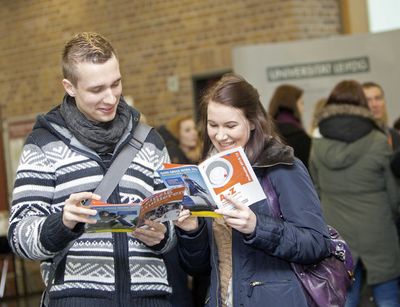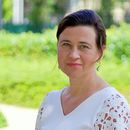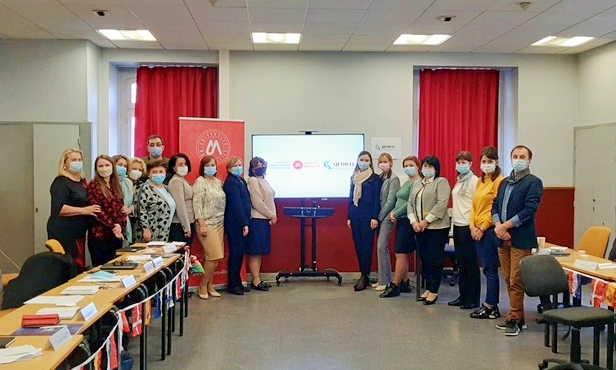Study office
Responsibilities
Study coordination & student mobility
For all questions and problems regarding the organization of your studies, the Study Coordination office is the point of contact for teachers and students alike. This office is responsible for planning and carrying out the module registration every semester. Other than this, it is a part of the administrative preparation of the application process in the master’s study programs. Further, there is a study program manager for the international study programs for our faculty in AlmaWeb. The study coordination is also available to answer any questions about student mobility at the faculty.
Curricular Management
The curricular managers in our faculty work closely together with the institutes towards further development and quality management in our faculty’s study programs. In addition to this, they accompany the revision and new establishment of study programs, support the subjects in the faculty with teaching review processes as well as the process of internal certification or program accreditation as well as the coordination of cooperations with other faculties.
Exam management
The exam management is responsible for all documents which are issued in the context of exams and the proof of exams. The tasks, among others, include:
- the issuance of the Transcript of Records (overview of current earned credits)
- the registration for final papers
- the íssuance of certificates
- Information regarding grading, exam dates, and repeat exams
Evaluation
The consultant for evaluation is there for you when it comes to the following topics:
● Evaluation of lectures
● Evaluation of study programs and student surveys
● Evaluation reports regarding quality management in the faculty
● Consultation regarding the conception of evaluative parts in third-party funding
Projects at the study office
The study office is known for its approach through its academic aspiration, the closeness to the subjects and the innovative and open perspective towards all areas of studying and teaching. The connection to academic teaching, networking within the university, the understanding for internationalization, and the possibility for inclusion in relevant, international third-party projects play an important role. Below is an overview of the study office’s projects.
Project length:
Since 2015
Funding:
Budget funds of the University of Leipzig and the Free State of Saxony
Partners:
- Prorector of Education and International Matters of the University of Leipzig
- Academic Lab of the University of Leipzig
Goal:
- Introduction of a contact point for peer-to-peer consultation for students about their studies and the organization of their studies
- Increase of success in studies
- Give relief to the study office, student counseling, and the Erasmus coordination at the institutes
Activities:
- Since 2015
- Set-up of Helpdesk with four assistants and the furnishing of an office with workstations and the opportunity for office hours for students
- Active support during module registration, including the preparation of attendance lists for teachers
- Since 2016
- Support for the institutes and the study office during the inspection of submitted documents for the applications of master’s study programs
- Consultation for potential students regarding the faculty’s study programs
- Presentation of the Helpdesk to potential students at Study Information Day and for new students during the introduction weeks
- Since 2017
- Consultation for incoming students regarding the start of their studies
- Support during the process of module and lecture evaluations at the faculty
- Since 2020
- Expansion of consultation services with digital office hours
- Introduction of digital tutorials for the beginning of studies and for the Open House day
- Since 2021
- Support for incoming students during module registration and personal consultation for international students regarding the organization of their studies
- Support for incoming students during module registration and personal consultation for international students regarding the organization of their studies
Results:
- Establishment of the Helpdesk as the first contact point for students for questions regarding the organization of their studies at the faculty
- Great results regarding the user behavior of the Helpdesk and the satisfaction of the students in student surveys
- Noticeable relief to the student counseling, study office, exam management and Erasmus coordination
Project length:
September 2015 - September 2016
Funding:
Budget funds of the University of Leipzig
Partners:
- Global and European Studies Institute of the University of Leipzig
- the Universities of the Erasmus Mundus Global Studies Consortium
- Department of Academic Administration
- Academic International Office (International Administrative Department)
- Student Office of the University of Leipzig
Goal:
- Accompaniment of a highly complex international study program (M.A. Global Studies) in the process of its complete integration into AlmaWeb.
- Documentation of the necessary steps and the requirements for the execution of all subprojects (application/approval, semester planning/module registration, exam management/printing of certificates)
- Insights and suggestions for a stabile personnel backup of academic administration of the international study programs in AlmaWeb.
Activities:
- Kick-off workshop
- Work in the subprojects application/approval, semester planning/module registration, exam registration/printing of certificates
- Configuration of the new selection process in AlmaWeb
- Shaping of the curricular parts of all partner universities of the Erasmus Mundus Global Studies Consortium
- Configuration of grade systems and grade conversion for all partner universities of the Erasmus Mundus Global Studies Consortium
- Roles and the bundling of rights (study coordination, semester planning, and exam management) for the academic administration of the international study programs in AlmaWeb
- Creation and testing of a transcript template at lecture level
- Analysis workshop and documentation of the results
Results:
- Complete integration of the most complex international study programs of the faculty into AlmaWeb
- Reliable data for the re-accreditation of the study program M.A. Global Studies
- Results, experiences, and suggestions for a stabile personnel backup of the academic administration of the international study programs of the faculty in AlmaWeb
- Results and experiences for the transfer of the faculty’s curriculum for Incomings to AlmaWeb
Project length:
15/11/2020 – 14/11/2023
Financing:
This Project is funded with support of the European Commission within the Erasmus+ programme.
Partner:
- Moldova State University, REPUBLIC OF MOLDOVA – coordinator
- University of Montpellier, FRANCE
- Leipzig University, GERMANY
- University of Salamanca, SPAIN
- European Policy Development and Research Institute, Maribor, SLOVENIA (EPDRI)
- Central and Eastern European Network of Quality Assurance Agencies in Higher Education (CEENQA)
- Academy of Economic Studies Moldova, REPUBLIC OF MOLDOVA
- Balti State University, REPUBLIC OF MOLDOVA
- Cahul State University, REPUBLIC OF MOLDOVA
- Comrat State University, REPUBLIC OF MOLDOVA
- Academy of Music, Theatre and Fine Arts, REPUBLIC OF MOLDOVA
- University of Political and Economic European Studies, REPUBLIC OF MOLDOVA
- National Agency for Quality Assurance in Education and Research, REPUBLIC OF MOLDOVA
- Ministry of Education, Culture and Research of the Republic of Moldova, REPUBLIC OF MOLDOVA
Goal settings:
This project aims at a thorough exchange on best practices both on the academic and the institutional levels in the field of quality assurance within the European Higher Education Area. One of the main goals of the project is to support the Moldovan Higher Education Institutions in their efforts to enhance the quality management and to build a new system of institutional accreditation.
The most important specific objectives are
- to promote and strengthen the quality assurance culture in Moldova and to build national consensus of the key-actors
- to develop and advance a national legislative framework and stimulate regulatory changes on quality assurance in HEIs
- to enhance the quality assurance management of HEIs in Moldova through international institutional accreditation
- to build the institutional capacities of HEIs in Moldova for efficient and effective implementation of quality assurance reform
Activities:
- Consortium meetings
- Country workshops on QA development
- Elaboration and adoption of QA tools: recommendations for reforming the national methodology on institutional QA accreditation; amendments to the Code of Education of the Republic of Moldova; adoption and publishing of evaluation procedures for accreditation of joint programs; translation, publishing of the institutional QA external evaluation guide
- Study visits on UQA strategy development: University of Montpellier/FRANCE, University of Salamanca /SPAIN, Leipzig University / GERMANY
- Training seminars on QA development and international institutional accreditation
- Developing the applications for international institutional accreditation
- Training seminars for university staff on institutional QA implementation
- Elaboration of the Action Plan following the external evaluation reports on institutional accreditation
- Elaboration of monitoring & evaluation manual
- Elaboration of advisory recommendations
- International institutional accreditation of the Moldovan universities
- Launching and concluding conferences
- Mass-media and institutional dissemination events
Results:
European level:
- exchange and mutual learning within the QFORTE-Consortium on various forms of institutional accreditation within the European Higher Education Area
- exchange and reflections within the HEIs of the QFORTE-Consortium on best practices, benefits and challenges of various quality assurance instruments
National level:
- recommendations for reforming the national Methodology on institutional QA accreditation
- developed amendments to the Code of Education of the Republic of Moldova
- developed evaluation procedures for accreditation of joint programs
- developed QA Institutional External Evaluation Guide
University level:
- strategies for QA development elaborated and adopted at each Moldovan HEI of the consortium
- QA manuals modernized at each Moldovan HEI involved in the project
- action plans for further QA consolidation elaborated after passing the international accreditation (sustainability of the project)
- the methodology of external institutional QA evaluation of HEIs applied
- active online platform for institutional QA external evaluation
Society:
- enhancement of the QA culture
- national consensus of the key-actors
- advancement of the national legislative framework on QA in Moldova;
- enhanced QA management of HEIs in Moldova through international institutional accreditation
Project length:
2020-2021
Funding:
Budget funds of the University of Leipzig
Partners:
- Central study coordination of the Department of Academic Administration
Goal:
The transcripts and grade overviews which were issued by the faculty’s exam management only had the module names and the module grades. Especially in the modules of the humanities and social sciences, modules consist of diverse lectures, which are very different from each other subject-wise and which are different each semester. A documentation of the actual content was not possible.
For applications in the job market, for a continuative study program, or a study program change, students had to resort to improvised and custom overviews, which were not considered official documents. This circumstance should be changed by releasing transcripts with information at the lecture level.
Activities:
- Meet-up and workshops with the study office and the central study coordination
- Collection of necessary information for the transcripts
- Adjustment of the presentation of all lectures of the past years in AlmaWeb for an optimal release
- Programming of the templates in AlmaWeb
- Completion and evaluation meeting
Results:
- Change to the release of transcripts at a lecture level through the faculty’s exam management
- A transcript as an official document for students for application and recognition at other universities
- Generation of the requirement for the management of incoming students in AlmaWeb
Project length:
2021 -
Funding:
Budget funds of the University of Leipzig
Partners:
- Central study coordination of the Department of Academic Administration
- ERASMUS-Coordination of the Institutes
Goal:
Exchange students from universities abroad have always played a special role in the past. Since there are no fixed guidelines, the organization of the semester for exchange students has always been difficult.
The management of exchange students also involved a great deal of work on an administrative level. Students could not be registered digitally and therefore could not prove that they had officially attended modules and courses. Exchange students had to collect all achievements and participations with process papers and at the end of their stay have a proof of achievement created by hand.
The aim of the project is for exchange students to be able to register themselves digitally in the modules and courses of the degree programs. They therefore take part in the events as regular students. Grades can be posted in AlmaWeb and the digital transcript of records for the home university can be created at the end of the stay.
As a pilot project, the project was initially only tested at the Faculty of Social Sciences and Philosophy. The aim is for other faculties to also take part in the future and for students to be able to enroll themselves digitally in interfaculty modules and courses.
Activities:
- Meetings and workshops with the study office, the ERASMUS subject coordinators of the institutes and the central study coordination
- Creation of a catalogue of modules open to exchange students
- Modeling of templates and modules in AlmaWeb
- First pilot phase with exchange students from the faculty in the winter semester 2022/23
- Planned: Evaluation meeting and continuation of the project with the International Office and other faculties
Results:
- With the support of the faculty's helpdesk, the exchange students were able to receive extensive support before the start of the semester. As a result, the students were able to register in the modules and for the exams completely independently during the module registration.
- Thanks to the new procedure and more stable structures, the semester preparation for exchange students has been made significantly easier and the options made more transparent.
- The data is now managed together with the registration data of the Leipzig students in Tool and AlmaWeb.
- At the end of the pilot semester, the examination management can generate the transcripts from AlmaWeb and send them to the students for their home university.













